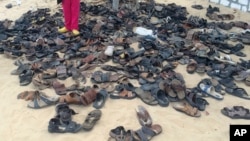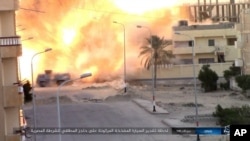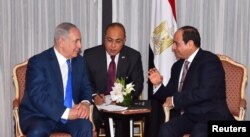Egypt and Israel have fought three wars, but now they reportedly are cooperating as they face a common foe: a jihadist insurgency in the Sinai.
However, neither state is acknowledging the warming ties.
On Friday, the Egyptian military spokesmen announced the launch of a major security operation against "terrorist and criminal elements and organizations" across the country, focusing on the northern and central Sinai region, where last year militants attacked a Sufi mosque killing 311 worshippers.
But they made no reference to mounting media reports that the Egyptian government has allowed Israel to fly surveillance drones and conduct dozens of airstrikes on an Islamic State group affiliate in Egypt's restive desert peninsula bordering Israel.
Egyptian army spokesperson Colonel Tamer el-Rifai on Sunday dismissed a report in The New York Times claiming Egypt has given the green light for more than 100 Israeli airstrikes in the northern Sinai in the past two years. The official said only Egypt's security forces were battling jihadists in the Sinai, and he warned Egyptian media only to report information supplied by the Egyptian military.
But the growing military cooperation has long been rumored.
In June, Israel's Institute for National Security Studies (INSS) noted that if the frequent claims of anti-terror coordination were accurate, it would show "the level of trust between the nations has reached the point where Israel is providing various military, technological and operational intelligence to Egypt and is operating attack UAVs [unmanned aerial vehicles] in Sinai with Cairo's approval."
Analysts say they doubt Israel is providing close air support for Egyptian troops, and they say the strikes could be launched from outside Egyptian airspace with drones and warplanes firing at targets inside Egypt's Sinai. The relationship appears to mirror the Israeli-Jordanian one — security cooperation, but as far from the public eye as possible.
Egypt's Sinai Peninsula borders Israel and the Gaza Strip, and has long been a bastion for Islamic insurgent groups tied to al-Qaida.
According to media reports, Israeli strikes in the Sinai are targeted at individuals or small groups of militants as opposed to infrastructure.
"That leads to a question of who is asking whom for help. Are the targets only those that pose a threat to Israel, or is this an attempt to aid Egypt?" The Jerusalem Post queried this week. Islamic State media outlets have for months claimed Israel has been conducting airstrikes against the terror group in the Sinai.
Warming relations
Relations between Egypt and Israel have improved dramatically since the army ousted Islamist Mohamed Morsi from the presidency in July 2013.
Egyptian President Abdel Fattah el-Sissi reinstated an ambassador in Tel Aviv in 2016, reversing Morsi's withdrawal of the envoy to protest a 2012 Israeli assault on Gaza. The same year, Egyptian Foreign Minister Same Shoukry visited Israel, making a trip to the home of Israeli Prime Minister Benjamin Netanyahu, where they spent time watching the Euro 2016 soccer final. It was the first time an Egyptian foreign minister had visited Israel in two decades.
Last September, el-Sissi met Netanyahu for the first time in public, the encounter coming ahead of the U.N. General Assembly in New York. According to the Egyptian leader, the pair had talked frequently before then. In a 2015 interview with The Washington Post, el-Sissi said he talked "a lot" with the Israeli prime minister, part of an effort to "reassure him that achieving peace [with the Palestinians] will be a historic deal for him and for Israel, and that we are ready to help reach this peace."
El-Sissi also said that the high level of trust between them had been demonstrated by Israel's willingness to authorize Egypt to deploy more troops and attack helicopters in areas in the Sinai permitted by the 1979 Camp David peace accord between the two countries.
"The hostile mood and skepticism have diminished with peace with Israel," el-Sissi said.
Security challenges
But even with joint efforts in the Sinai, the security challenge for Egypt has become more formidable, analysts say.
According to the International Crisis Group, a New York- and Brussels-based research organization, the security situation "deteriorated considerably in 2017 with local jihadists perpetrating attacks that have targeted civilians and claimed hundreds of lives."
In a report published last month, the ICG warned "this trend is likely to continue in 2018, given the government's inadequate efforts to protect vulnerable groups, its counterproductive habit of labeling political dissidents as terrorists, and its ineffective counterterrorism."
"There was a qualitative and quantitative change in the nature of major attacks carried out against civilians in 2017," ICG said. "Two religious groups — Christians, who account for 10-15 percent of Egypt's population, and Muslims who follow Sufi practices — increasingly are targeted by local affiliates of Islamic State, which had initially focused almost exclusively on security forces."






